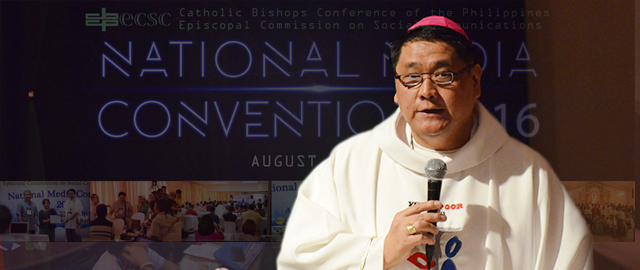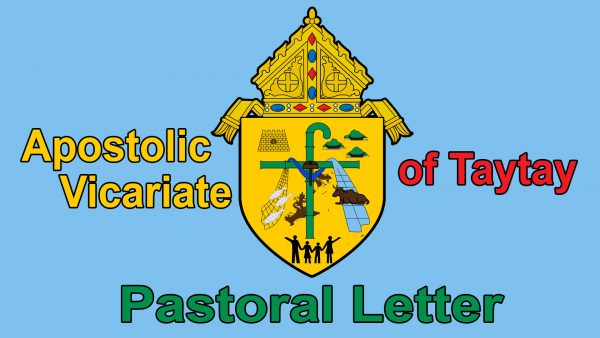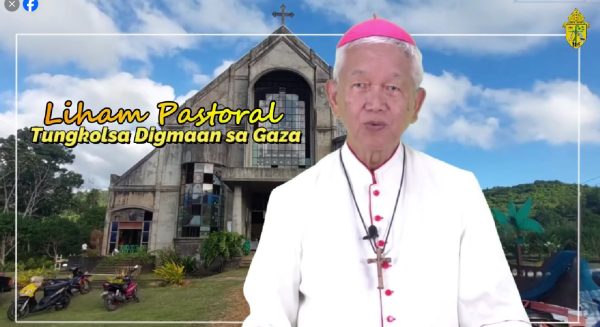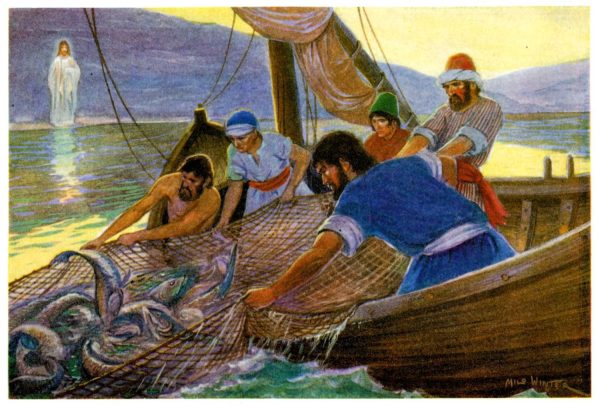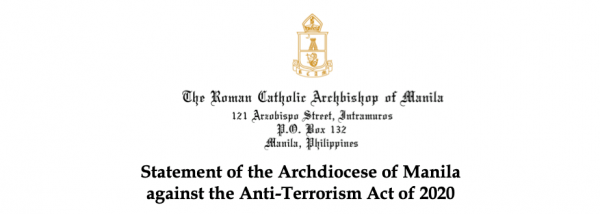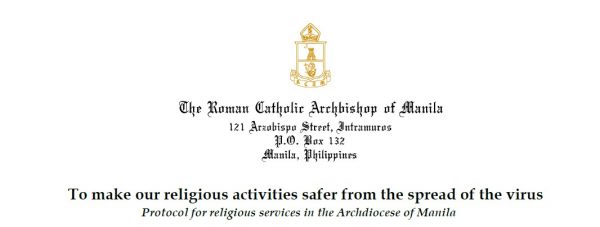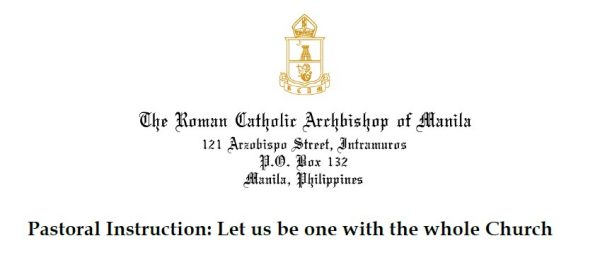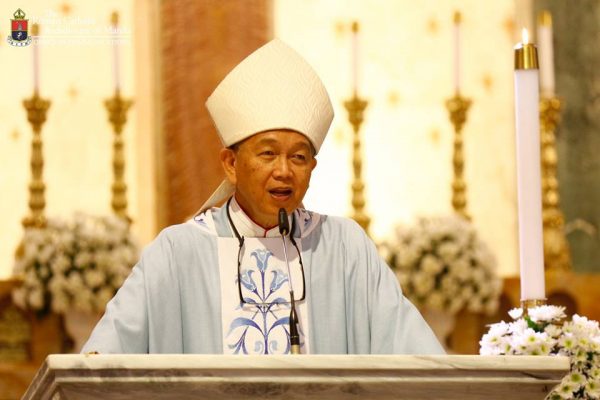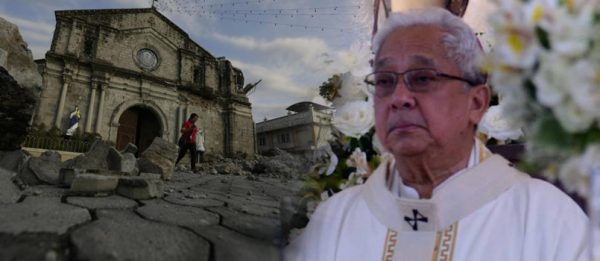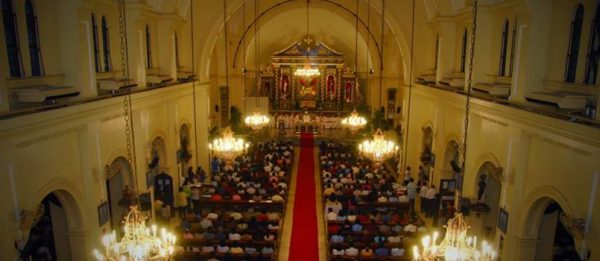194 total views
Good morning and welcome to our media convention!
Let me share some thoughts with you as we hold our 2nd National Media Convention. I’m sure that you are well aware that we face many challenges as practitioners of social communications. We have a new Philippine president who seriously wants real change in our country, given his fight to eradicate drug pushing and addiction, his mandate for peace and order, his drive to remove graft and corruption, and his passion for the economic well-being of all citizens in our land. However, there are anxious and fearful sentiments about extra-judicial killings, the violation of human rights, the passage of anti-life and anti-family bills like the death penalty and divorce, respectively. Moreover, we are on the road to the possible actualization of charter change which may lead to federalism.
With all these issues before us, we ask ourselves: Can the Church still play a pivotal role in asserting her influence to promote the gospel values; for instance, in line with this year’s jubilee celebration, to communicate the mercy and compassion of Jesus? The question becomes doubly significant since there seems to be an observation that the Church is currently undergoing a crisis of relevance in her mission of evangelization. What do I mean? Let me share something I overheard from a priest last May of this year, during the electronic counting of the ballots, when it was evident that Mayor Rodrigo Duterte, who was on the top spot, was to win by a big margin of 6 million votes over the candidate who was in second place. This priest shared a remark of Cardinal Luis Antonio ‘Chito’ Tagle that I would paraphrase in this way: “After all the voter’s education geared to aid the faithful to choose a candidate who will uphold catholic principles, and even negative comments from Catholic circles against Mayor Duterte, the results of the elections reveals that whatever has been said against him have landed on deaf ears, so to speak. It may be an indication of how distant we are, as Church leaders, from the pulse of the faithful. It seems we are not in touch with the people. Are they still listening to the Church?” To borrow the words of Pope Francis, we do not ‘smell like our sheep’. Thus, we dare to ask: Are we still relevant as a Church? And if we think and feel we are not, how can we be relevant to face the challenges confronting us? To answer this, let me respond with three words: Identity, Possibility and Creativity.
The first word is identity. Obviously, this refers to who we are. We know are nothing, yet made special and precious in God’s eyes. As human beings and Christians, we are imago Dei, made in the image and likeness of God, and we are children of the Father, belonging to God’s family by virtue of baptism. What is the reason for this? I can think of only one: God’s mercy!
In Hebrew language, mercy is derived from the word hesed which speaks of what one can do for another either by God or any human person. So it is an act done by another. In Latin, the word for mercy is misericordia which can be broken down into two terms: miser which means ‘poor’, ‘miserable’, ‘wretched’ and cor which means ‘heart’. So from the etymology of the Latin terms, misericordia literally means ‘miserable heart’ or better ‘a heart that beats for the miserable’. We are grateful to God because, even in our personal lives, we realize how God has always been there, showing an act of love, his heart beating for us, miserable, poor sinners as we are. Fr. James Keenan, a Jesuit moral theologian defines mercy as “an act of rescue”. In a Christian sense, we, then, also understand how God rescued us from the pangs of sin and death through his only begotten Son, Jesus Christ. By the mercy of God, we, sinners, were rescued or saved because of Jesus’ unconditional love exemplified as he laid down his life by his dying on and rising from the cross.
Another word that deepens our understanding of mercy is the word ‘compassion’. Its Latin root has two terms, cum which means ‘with’ and pati which means ‘to suffer’, when put together means “to suffer with”. The compassionate love of Jesus is manifested in his decision to suffer with us from the moment he became flesh, being Emmanuel, God-with-us, except sin. This became more manifest as he ministered to and suffered with the sick, the disabled, the helpless, and, of course, the poor during his time. Jesus’ crucifixion is his suffering with and for us, carrying all our wounds and pains so that we, too, like him experience his healing love and the glory of a resurrected life. In the Gospels, the expression “to be moved with compassion” comes from the Greek verb splangchnizomai, its root word is splangchna which means entrails of the body or “lamang loob,” that is, from the gut. In Hebrew, the term for compassion is rachamim which means “womb of Yahweh” In this light, we understand why Rembrant’s beautiful painting, “The Return of the Prodigal Son,” powerfully depicts the compassion of God showing how the younger son who comes home lays his head on his father’s belly, manifesting how, like a mother, he can never reject his sinful son who came from his womb and will always be part of him, bone of his bone, flesh of his flesh, deeply bonded by love. For this reason, we are all called to live out the words of Jesus: “Be compassionate as your Father is compassionate.” (Luke 6:36) In the words of one of my favorite spiritual writers, Henri Nouwen: “Compassion asks us to go where it hurts, to enter into places of pain, to share in brokenness, fear, confusion and anguish. Compassion challenges us to cry out with those in misery, to mourn with those who are lonely, to weep with those in tears. Compassion requires us to be weak with the weak, vulnerable with the vulnerable, and powerless with the powerless.” (Compassion, p. 4, 1983) Thus, if we recognize our identity borne out of the mercy of compassion of God, then our way of being social communicators would always be done not out cynicism but sensitivity, not out of rash judgment but understanding and not out of hate but love.
The second word is possibility. When faced with a tough project and we are pushed to our limits, there is a tendency, at times, to think that there are no more options or no more alternatives to achieve our task. But you and I know that life is full of possibilities. Our very existence is a possibility that has become a reality. Even the impossible is a possibility.
One proof of the seemingly impossible is what we experienced last year. It was on 29th of July 2014 when Pope Francis announced that he will be coming to the Philippines from the 15th to the 19th of January 2015. Unlike World Youth Day which happens every two years, an event that happened in Poland just last month; or the World Meeting of Families which takes place every three years which took place in Philadelphia, U.S.A. in September last year; or the International Eucharistic Congress which is celebrated every four years, the most recent event held in Cebu last January, we had barely six months to prepare for the Holy Father’s Apostolic Visit to our country. The theme of the papal visit was: Mercy and Compassion. With such short time given, it was a great challenge and a dream-come-true for all of us assigned to overseer the media coverage of this historic visit to communicate not just locally but internationally, Pope Francis’ message of the mercy and compassion of Jesus. It was a humungous task to use all available channels of social communications in order to project and amplify this message so that people from all walks of life may consider letting go of our individualism and indifference, and letting God move us to be merciful and compassionate to others, especially to the poor and suffering in our midst. In hindsight, I think it was evident that we were able to fulfill the task entrusted to us, as instruments of social communications, because of God’s mercy and compassion. Indeed, as the Lord himself said, with God all things are possible. (Lk 19:27)
Some of you here may feel incompetent in your assignment as a minister or director of social communications in your diocese. There are those who are already exhausted racking their brains on how to make both ends meet for their radio station. And there are others who know they are lagging behind in their method of evangelization and could not cope with the fast pace of technological advancement in this digital age. Look back at your experience. Somehow, God has found a way to make you survive and still be where you are. You have thought of possibilities that have made you solve your seemingly impossible problems. In fact, God has led you here to explore new possibilities that can make your work grow and flourish.
The third and final word is creativity. How can we creatively evangelize our young people immersed in an electronic, digital milieu? Are we even willing to channel a great chunk of our resources for creative evangelization so the youth, who almost always look at their mobile phones, Ipads, laptops and desktop computers, and who, a number of times, feel that Sunday mass is irrelevant, will be able to know, understand, and perhaps desire Christ in their lives?
One time, the chaplain of one of our parochial schools presided over a first Friday mass for elementary and high school students. During his homily, he did an exercise to check how many attended the past Sunday mass. He asked those who did not attend to raise their hands with the instruction that all of the students and even the teachers close their eyes so that no one will feel embarrassed in case he or she raised his or her hand. To his great surprise, there were many students and even some teachers who raised their hands, admitting that they did not go to mass.
Creativity in evangelization is the call of the times. On a number of occasions, I have shared how Bo Sanchez, one of our most popular lay preachers, have been challenged to think “out of the box” in his task to proclaim the gospel. He is very much aware that, in as much as he is in touch with the 15% of catholics who go to mass and listen to his preaching on TV, he must target the 85% who are nominal catholics and find going to mass on Sunday no longer relevant in their lives. Because of this, he thought of organizing what he calls “The Feast” that happens sort of simultaneously in different parts of the country on Sunday outside the parish church walls. Mass is still celebrated for those who gather and assigned lay preachers called “builders” give a teaching on God’s word in their respective “feasts” held in designated places. The biggest gathering is held in the Philippine International Convention Center (PICC) where Bo Sanchez is their “builder”. There are over 100 “feasts” that take place every Sunday all over the country. Bo Sanchez told me how he is amazed by the increase of new attendees each Sunday. I was fortunate to see this for myself when I was invited to celebrate mass in a two “feasts” held in my diocese. I was struck by the flux of people who filled the session halls, most of them young people. In fact, they have a creative corner where new comers are recognized during the celebration.
For his 50th World Communications Day Message, Pope Francis chose the theme: “Communication and Mercy: A Fruitful Encounter”. The Holy Father stressed: “If our hearts and actions are inspired by charity, divine love, then our communication will be touched by God’s own power. Communication has the power to build bridges, to enable encounter and inclusion, and thus, to enrich society, avoiding misunderstanding, healing wounded memories, and building peace and harmony.” It is our hope that our invited speaker, Mr. Sean Patrick Lovett, together with his team, will help us to seriously recognize our identity as social communicators mercifully loved by God, aid us to excitedly explore numerous possibilities that can develop our multi-media ministry, and animate us to creatively evangelize people in this E-generation.
Believe Pope Francis. We can build bridges and break down walls. We can enable encounter and avoid exclusion. We can heal wounds and stop the vicious cycle of hate. We can become peacemakers and do our part so that people everywhere can be ‘Merciful like the Father.’
– Most Rev. Mylo Hubert C, Vergara, DD, MA, SThD, Aug. 22, 2016

